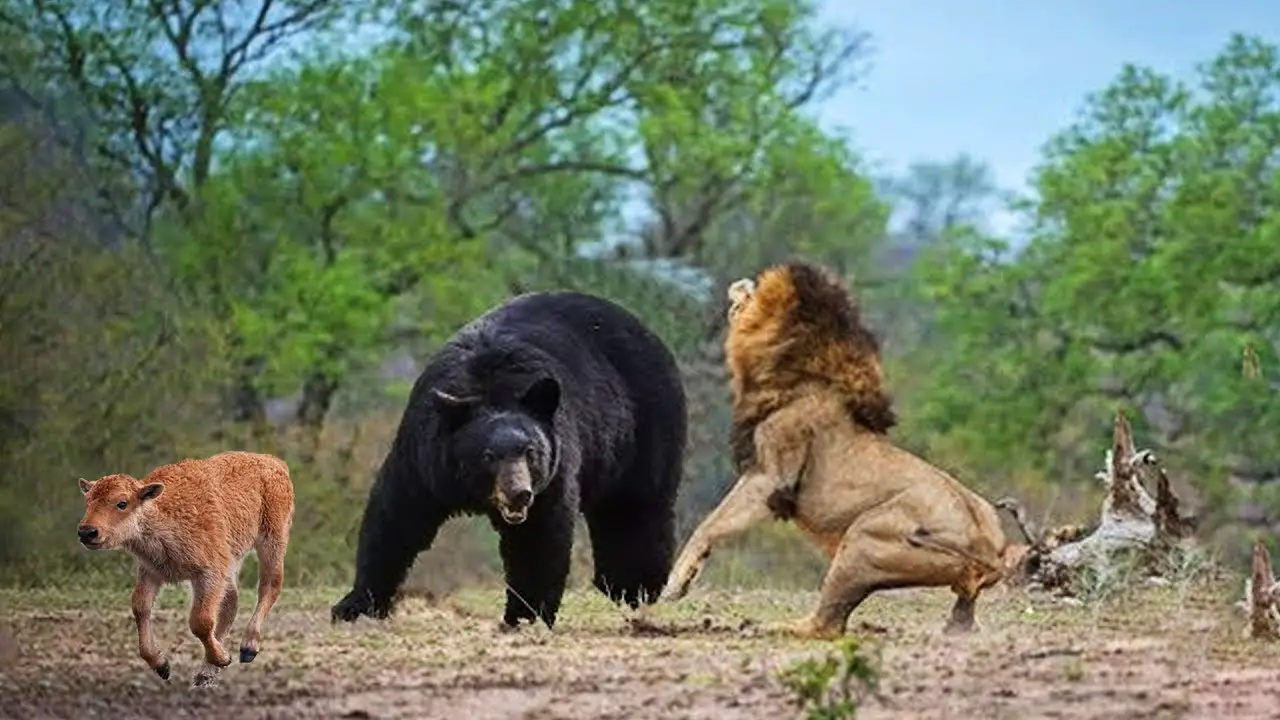The ultimate predator showdown: lion vs bear. Who would win in a fight between the king of the savanna and the powerhouse of the forest? This in-depth analysis compares their size, strength, weapons, and fighting tactics to determine the likely victor. While lions boast speed and agility, grizzly bears counter with brute force and endurance. We examine every factor - from bite force to combat strategies - to settle this age-old debate between two of nature's most formidable hunters.
Table of Contents
Introduction
The idea of a fight between a lion and a grizzly bear has fascinated people for a long time. Both animals are powerful predators with unique skills. This comparison looks at their size, strength, hunting tactics, and behavior to find out which one would likely win in a face-off.
1. Physical Attributes
Lion vs Bear: Size, Strength, Adaptations, and Weight Breakdown
To understand the dynamics of a lion-bear fight, we must first dissect their physical differences.
The African Lion (Panthera leo)
- Average Weight:
- Males: 330–550 lbs (150–250 kg)
- Females: 265–400 lbs (120–180 kg)
- Body Length: 6–8 ft (1.8–2.5 m) excluding the tail.
- Shoulder Height: 3.5–4 ft (1–1.2 m).
- Muscle Structure: Lean, agile muscles optimized for bursts of speed and grappling prey.
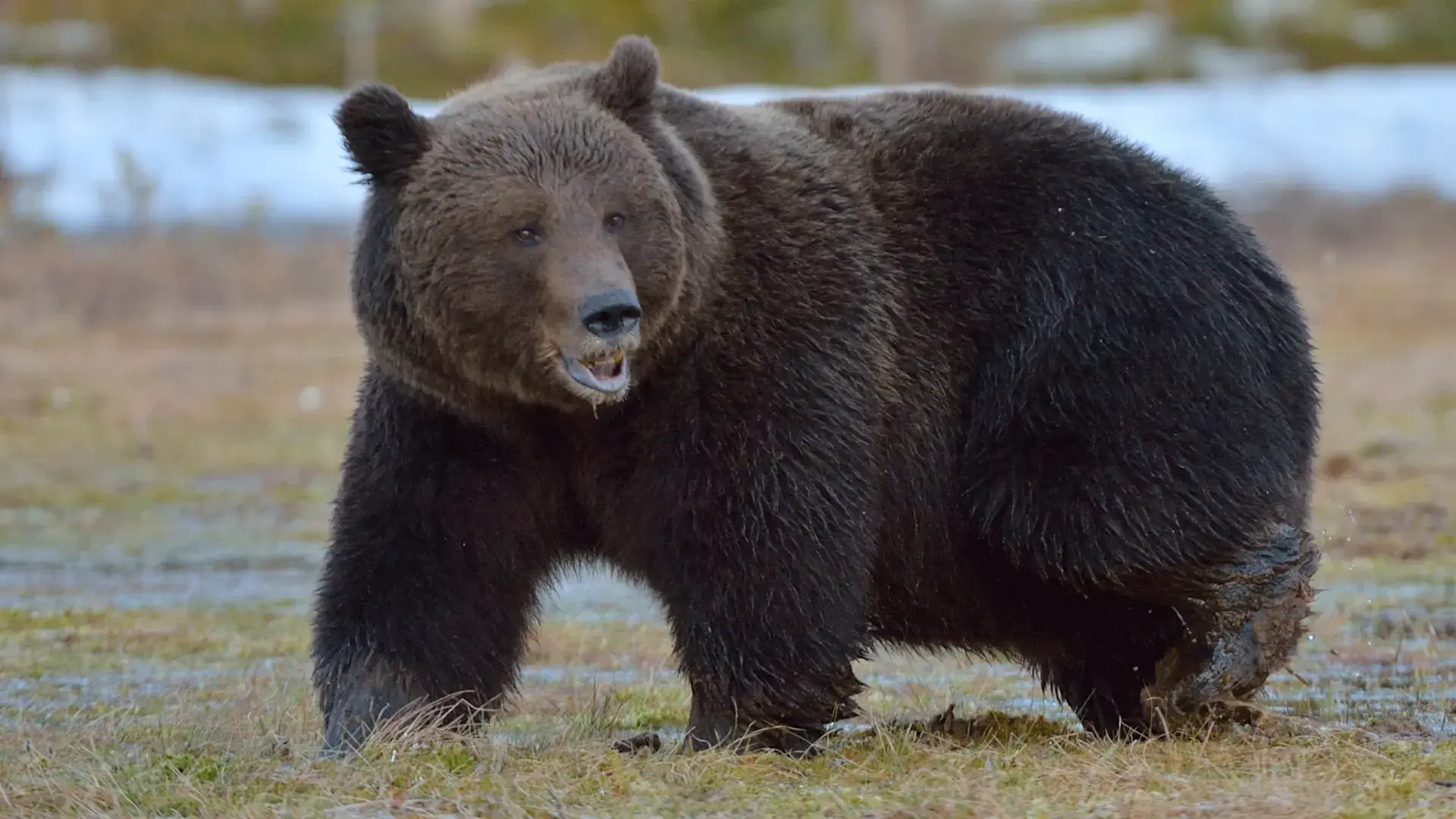
The Grizzly Bear (Ursus arctos horribilis)
- Average Weight:
- Males: 600–900 lbs (270–410 kg)
- Females: 400–600 lbs (180–270 kg)
- Body Length: 7–9 ft (2.1–2.7 m).
- Shoulder Height: 3.5–4.5 ft (1–1.4 m) on all fours; up to 8 ft when standing.
- Body Composition: Dense bones, thick fat layers (up to 4 inches), and muscle mass built for raw power and endurance.
Lion vs Bear Physical Attributes breakdown
| Feature | African Lion (Panthera leo) | Grizzly Bear (Ursus arctos horribilis) |
|---|---|---|
| Average Weight (Male) | 330–550 lbs (150–250 kg) | 600–900 lbs (270–410 kg) |
| Average Weight (Female) | 265–400 lbs (120–180 kg) | 400–600 lbs (180–270 kg) |
| Body Length | 6–8 ft (1.8–2.5 m), excluding tail | 7–9 ft (2.1–2.7 m) |
| Shoulder Height | 3.5–4 ft (1–1.2 m) | 3.5–4.5 ft (1–1.4 m) on all fours; up to 8 ft when standing |
| Muscle Structure/Body Composition | Lean, agile muscles for speed and grappling prey | Dense bones, thick fat layers (up to 4 inches), and powerful muscle mass |
| Primary Adaptation | Speed and agility for hunting | Raw power and endurance for foraging and defense |
Speed and Agility
African Lion (Panthera leo)
- Top Speed: 50 mph (80 km/h) in short sprints.
- Agility: Highly agile with a flexible spine and retractable claws.
- Maneuverability: Capable of quick turns and precise strikes.
- Hunting Style: Ambush predator that uses stealth and teamwork to isolate prey.
- Primary Strength: Speed and coordinated pack hunting.
Grizzly Bear (Ursus arctos horribilis)
- Top Speed: 35 mph (56 km/h) over short distances.
- Agility: Less agile due to a bulkier frame, but strong and powerful.
- Maneuverability: Limited turning ability, yet powerful enough to change direction quickly.
- Hunting Style: Opportunistic omnivore that hunts solo or scavenges.
- Primary Strength: Sheer strength, endurance, and powerful swipes.

In short distances, the African lion can sprint at a top speed of approximately 50 mph (80 km/h). This speed is very important in the hunting process because it enables lions to be able to run very fast in chase for prey. Nevertheless, these feline predators are only able to keep up such high speeds for a few minutes owing to their well-developed musculature and the great amount of energy that is consumed during running at full capacity. Lion vs Cheetah speed test: Who is the Fastest Predators
Lion vs Grizzly Bear Speed and Agility breakdown
| Feature | African Lion (Panthera leo) | Grizzly Bear (Ursus arctos horribilis) |
|---|---|---|
| Top Speed | 50 mph (80 km/h) in short sprints | 35 mph (56 km/h) over short distances |
| Agility | Highly agile with a flexible spine and retractable claws | Less agile due to a bulkier frame, but strong and powerful |
| Maneuverability | Capable of quick turns and precise strikes | Limited turning ability, but powerful enough to change direction quickly |
| Hunting Style | Ambush predator that uses stealth and teamwork to isolate prey | Opportunistic omnivore that hunts solo or scavenges |
| Primary Strength | Speed and coordinated pack hunting | Sheer strength, endurance, and powerful swipes |
Final thoughts on Lion vs Bear Physical Attributes
When it comes to Physical Attributes, The Grizzly Bear would probably come out on top. This is because it is larger, stronger, and sturdier than the Lion. Even though lions are speedy and graceful, they would still be outweighed by bears who also have more body muscle and power. This confirms Bear is a clear winner.
2. Weapons and Surviving Tools
Claw Showdown: Slashing vs Crushing
African Lion (Panthera leo):
- Claw Length: 1.5 inches (retractable)
- Function: Gripping prey, slashing
- Damage Potential: Deep lacerations
- Key Advantage: Precision in gripping and cutting through flesh
- Usage: Primarily used during hunting to latch onto and immobilize prey
Grizzly Bear (Ursus arctos horribilis):
- Claw Length: 2–4 inches (non-retractable)
- Function: Digging, tearing, crushing
- Damage Potential: Bone-breaking swipes
- Key Advantage: Raw power and durability
- Usage: Utilized for foraging, digging, and delivering crushing blows in combat
Analysis:
- Lions use claws like scalpels to weaken prey.
- Bears wield claws as bludgeoning tools—a single swipe delivers 1,200–1,500 psi, enough to snap a moose’s spine.
Bite Force: Crushing Power
- Lion Bite Force: ~650–1,000 psi.
- Targets: Throats and skulls of prey like zebras.
- Grizzly Bite Force: ~1,200 psi.
- Capable of crushing bison skulls or steel traps.
Lion vs Grizzly Bear Claw and Bite Force Comparison
| Attribute | African Lion (Panthera leo) | Grizzly Bear (Ursus arctos horribilis) |
|---|---|---|
| Claw Length | 1.5 inches (retractable) | 2–4 inches (non-retractable) |
| Claw Function | Gripping prey, slashing | Digging, tearing, crushing |
| Damage Potential | Deep lacerations | Bone-breaking swipes |
| Key Advantage | Precision in gripping and cutting through flesh | Raw power and durability |
| Claw Usage | Primarily used during hunting to latch onto and immobilize prey | For foraging, digging, and delivering crushing blows in combat |
| Analysis (Claws) | Lions use claws like scalpels to weaken prey | Bears wield claws as bludgeoning tools; a single swipe delivers 1,200–1,500 psi, enough to snap a moose’s spine |
| Bite Force | ~650–1,000 psi | ~1,200 psi |
| Bite Target | Throats and skulls of prey like zebras | Capable of crushing bison skulls or steel traps |
| Bite Strength | Effective for suffocating prey | Powerful enough to break bones and crush metal |
Final thoughts on Lion vs Grizzly Bear Claw and Bite Force Comparison
In the Claw and Bite Force Comparison, the Grizzly Bear emerges as the winner. Its longer, non-retractable claws deliver bone-crushing power, while its bite force of around 1,200 psi is significantly stronger than the lion’s. Although lions have precise, slashing claws and a bite force of 650–1,000 psi, the bear's raw strength and durability give it the edge.
3. Hunting and Combat Tactics
Lion Tactics: The Art of Ambush
- Teamwork: Lions hunt in prides to isolate and overwhelm prey.
- Kill Shots: Precision bites to the throat or suffocation via muzzle clamp.
- Weakness: Solo lions (like nomadic males) struggle against larger, armored opponents.
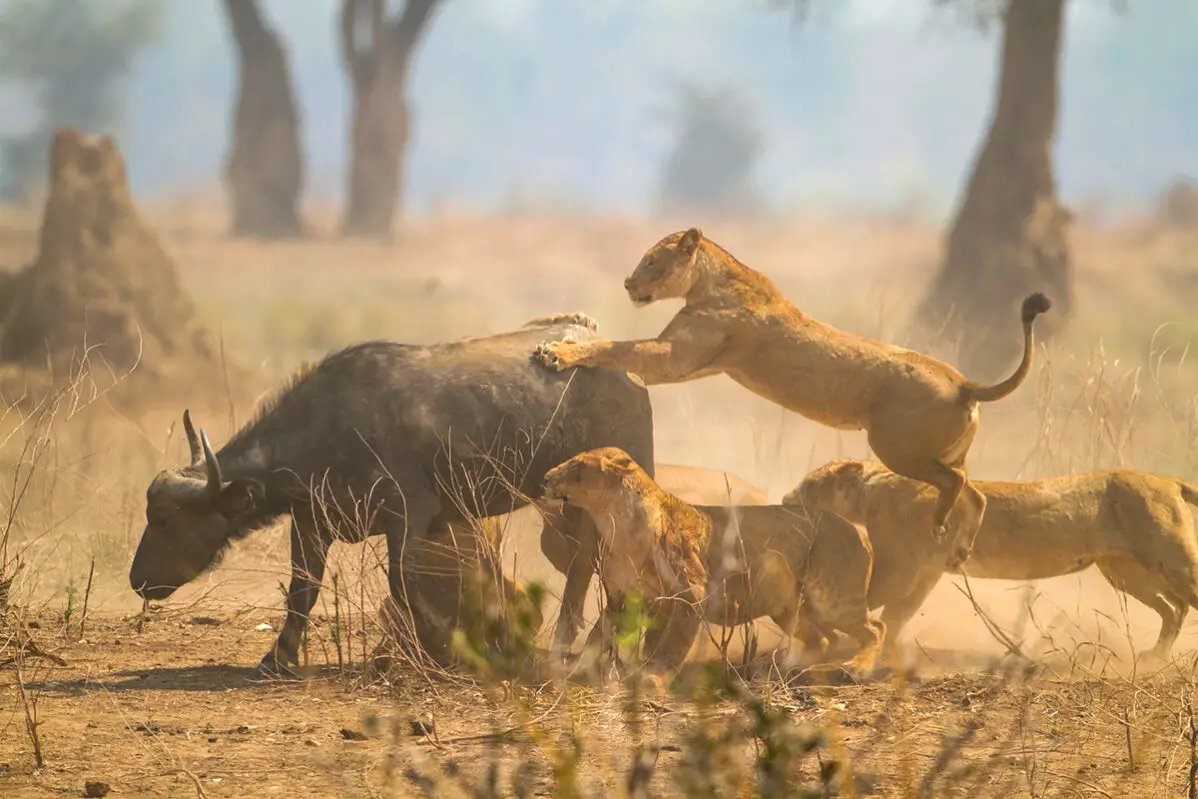
Bear Tactics: Overwhelming Force
- Standing Threat: Rising on hind legs to intimidate and strike downward.
- Defensive Postures: Using weight to pin opponents or shield vulnerable areas.
- Swatting Power: A single paw strike can deliver 7,000–8,000 lb of force.
Lion vs. Bear: Tactics Comparison
| Tactics | African Lion (Panthera leo) | Grizzly Bear (Ursus arctos horribilis) |
|---|---|---|
| Hunting Strategy | Teamwork: Hunts in prides to isolate and overwhelm prey | Overwhelming Force: Uses size and strength to dominate |
| Kill Shots | Precision bites to the throat or suffocation via muzzle clamp | Crushing bites and swatting with immense force |
| Weakness | Solo lions struggle against larger, armored opponents | Limited agility compared to fast, agile predators |
| Intimidation Tactics | Standing on hind legs to appear larger and strike downward | |
| Defensive Techniques | Uses body weight to pin opponents and protect vulnerable areas | |
| Swatting Power | A single paw strike can deliver 7,000–8,000 lbs of force |
Final thoughts on hunting and combat tactics
In the Tactics Comparison, the Grizzly Bear holds the advantage due to its overwhelming force, intimidating presence, and powerful swatting ability, delivering up to 8,000 lbs of force per strike. While lions excel in teamwork and precision strikes, solo lions struggle against larger foes. The bear’s ability to dominate with sheer power and defensive tactics makes it the more formidable opponent.
4. Territorial and Behavioral Insights
Lion Behavior: Calculated Aggression
- Territoriality: Males defend prides but avoid unnecessary fights to prevent injury.
- Risk Aversion: Lions retreat if a hunt seems too dangerous.
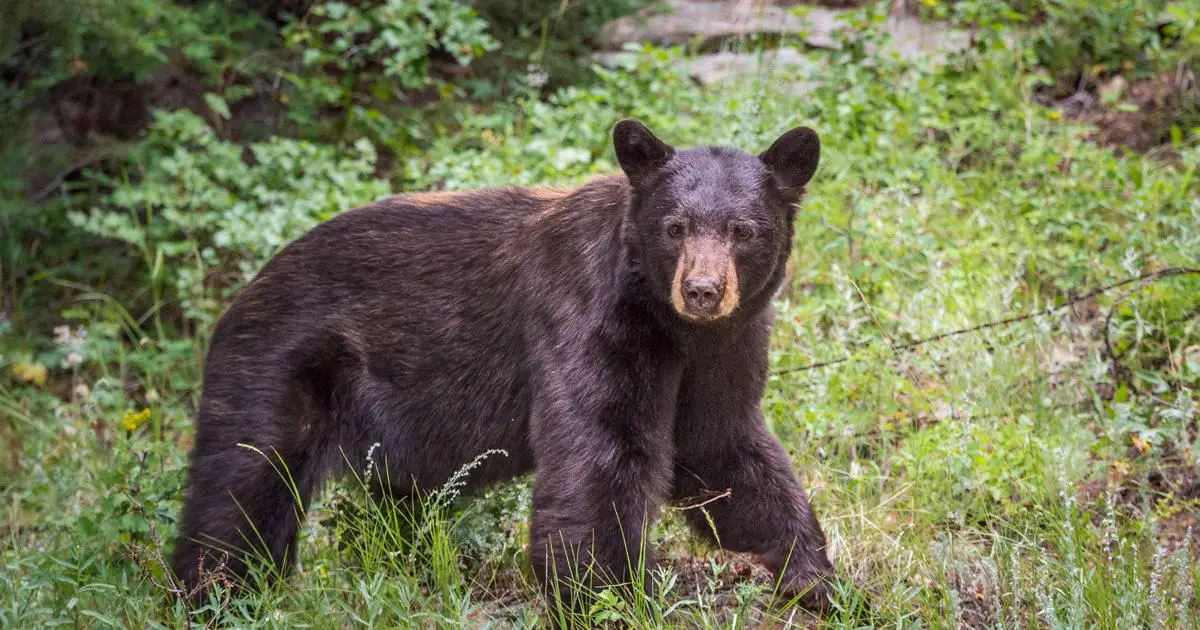
Bear Behavior: Unpredictable Ferocity
- Hyperphagia-Driven Aggression: Bears in pre-hibernation (fall) are 30% more aggressive.
- Defensive Mothers: Female grizzlies with cubs are among the most dangerous animals on Earth.
Behavior Comparison: African Lion vs. Grizzly Bear
| Behavior | African Lion (Panthera leo) | Grizzly Bear (Ursus arctos horribilis) |
|---|---|---|
| Territoriality | Males defend prides but avoid unnecessary fights to prevent injury | Defends territory, especially near food sources and during mating season |
| Risk Aversion | Retreats if a hunt or conflict appears too dangerous | Less cautious, especially during hyperphagia (pre-hibernation) |
| Aggression Trigger | Calculated aggression to maintain pride safety | Hyperphagia-driven aggression: 30% more aggressive in fall |
| Maternal Defense | Lionesses protect cubs, but avoid direct confrontations if possible | Female grizzlies with cubs are highly aggressive and among the most dangerous |
| Behavior Pattern | Calculated and strategic | Unpredictable and potentially ferocious, especially when provoked |
Final thoughts on Territorial and Behavioural Insights
In the Behavior Comparison, the Grizzly Bear is more unpredictable and aggressive, especially during hyperphagia or when protecting cubs. In contrast, the African Lion exhibits calculated aggression, prioritizing safety to avoid injury. While lions strategize to maintain pride stability, bears can become highly ferocious without warning, particularly females with cubs, making bears generally more dangerous in unpredictable situations.
5. Hypothetical Showdown
Scenario 1: Open Savanna
- Lion Advantage: Speed allows hit-and-run attacks.
- Bear Counter: Absorb initial strikes, then grapple and crush.
Scenario 2: Dense Forest
- Bear Dominance: Close quarters favor swiping and weight-based pins.
- Lion Limitation: Limited space reduces agility.
Scenario 3: Waterhole Ambush
- Lion’s Edge: Could ambush a drinking bear.
- Bear’s Resilience: Even injured, its endurance might turn the tide.
Hypothetical Showdown: Lion vs. Grizzly Bear
| Scenario | African Lion Advantage | Grizzly Bear Counter / Advantage |
|---|---|---|
| Open Savanna | Speed allows hit-and-run attacks | Absorbs initial strikes, then grapples and crushes |
| Dense Forest | — | Close quarters favor swiping and weight-based pins |
| Lion Limitation | Limited space reduces agility | — |
| Waterhole Ambush | Could ambush a drinking bear | Even injured, endurance might turn the tide |
Final thought on Hypothetical Showdown
In the Hypothetical Showdown, the Grizzly Bear holds the advantage overall. While lions leverage speed and ambush tactics in open areas, the bear’s resilience, immense strength, and ability to dominate in close quarters give it the upper hand. Even if injured, the bear’s endurance often turns the tide, making it the likely winner in most scenarios.
Final Verdict: Who Is the Winner?
This detailed comparison reveals that while the African lion is a master of speed, agility, and coordinated hunting tactics, the grizzly bear outmatches it in sheer size, strength, and durability.
- Physical Attributes: The bear outweighs and outsizes the lion, with denser muscles and thicker fat layers that provide endurance and protection.
- Claws and Bite Force: Bears have longer, non-retractable claws capable of crushing bone and a stronger bite (~1,200 psi vs. lion’s 650–1,000 psi), delivering devastating damage.
- Combat Tactics: Lions rely on stealth and teamwork, but solitary lions struggle against larger opponents. Bears wield overwhelming power, defensive postures, and powerful swipes that can generate thousands of pounds of force
- Behavior: Bears are less predictable and more aggressive, especially females protecting cubs or during hyperphagia, whereas lions tend to avoid unnecessary fights to preserve the pride.
- Environmental Advantage: In open savanna, lions use speed for hit-and-run attacks, but bears absorb damage and counterattack. In dense forests or close quarters, bears dominate due to their power. Even in ambush scenarios, a bear’s endurance can shift outcomes.
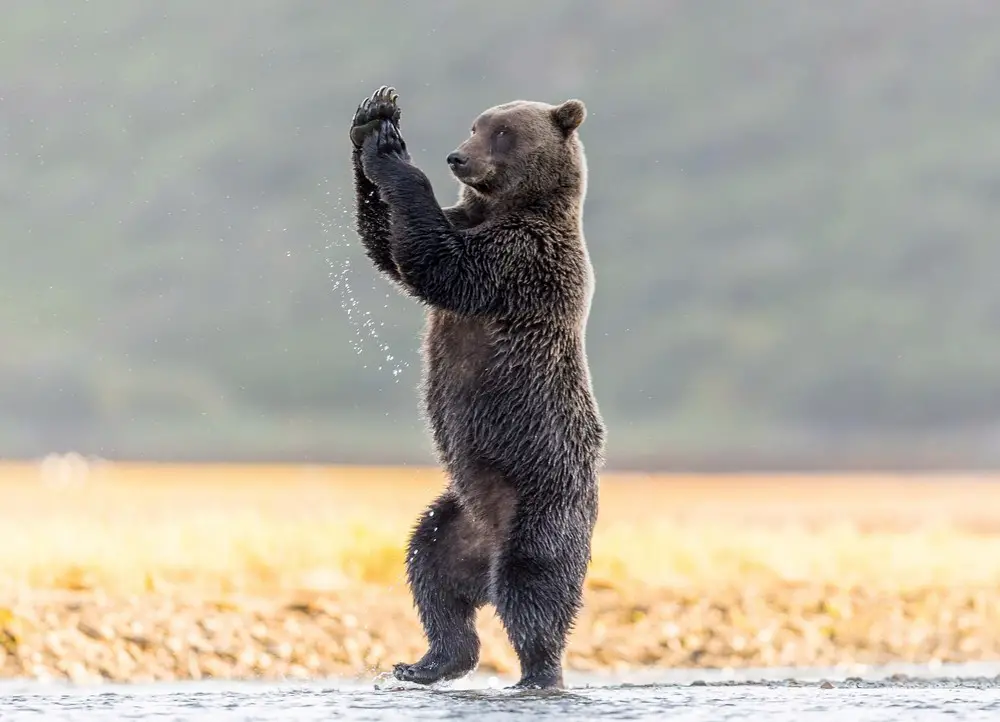
Winner: The Grizzly Bear
Based on size, strength, claw and bite power, combat tactics, and behavioral ferocity, the grizzly bear emerges as the dominant force in a direct confrontation with a lion. While the lion’s speed and agility are impressive, the bear’s raw power, resilience, and ability to withstand damage give it a clear advantage in nearly every hypothetical scenario.
Additional Resources
- Books:
- The Last Lions of Africa by Anthony Ham
- Bear Attacks: Their Causes and Avoidance by Stephen Herrero
- Documentaries:
- Planet Earth II (BBC) – “Grasslands” (Lions)
- Grizzly Man (Werner Herzog) – Bear Behavior Study
- Podcasts:
- Wild Kingdom (National Geographic)
Engage With Us: Who’s your pick? Share your thoughts on comment bellow
Lion vs Bear FAQs
Who would win in a fight between a lion and bear?
The grizzly bear would likely win in a direct fight. Its larger size, superior strength, longer claws, and powerful bite force (around 1,200 psi) give it a significant advantage over the lion, whose main strengths lie in speed and agility.
How does the size of a lion compare to that of bear?
Male lions weigh between 330–550 lbs (150–250 kg) and stand 3.5–4 ft (1–1.2 m) tall at the shoulder. In contrast, male grizzly bears weigh between 600–900 lbs (270–410 kg) and can reach up to 4.5 ft (1–1.4 m) on all fours and 8 ft when standing.
What are the primary weapons of a lion and a bear?
Lions use their sharp, retractable claws (1.5 inches long) to grip and slash prey, while bears have longer, non-retractable claws (2–4 inches) designed for digging and delivering crushing blows. Additionally, the grizzly bear bite force is significantly stronger (~1,200 psi) compared to the lion (650–1,000 psi).
How do the hunting styles of lions and grizzly bears differ?
Lions are ambush predators that hunt in prides, using speed and coordination to isolate prey. Grizzly bears, on the other hand, are opportunistic omnivores that hunt solo, relying on brute strength and endurance rather than teamwork.
What are the main behavioral differences between lions and grizzly bears?
Lions exhibit calculated aggression and avoid unnecessary conflicts to preserve the pride, while grizzly bears are unpredictable and can be highly aggressive, especially during hyperphagia (pre-hibernation) or when protecting cubs.
In what environments would a lion or grizzly bear have the upper hand?
Lions would have an advantage in open savannas where speed and agility matter, while grizzly bears dominate in dense forests or confined spaces due to their strength and swiping power.
Can a lion speed overcome a bear strength in a fight?
While a lion can reach speeds of 50 mph (80 km/h) in short bursts, this speed advantage may not be enough against the bear powerful swipes and resilience. In most scenarios, the bears size and power would likely prevail.
Why are grizzly bears considered more aggressive than lions?
Grizzly bears are known for their unpredictable nature, especially during hyperphagia or when mothers are defending cubs. Lions, by contrast, are strategic and often retreat from unnecessary fights to avoid injury.
Are there real-life records of a lion fighting a grizzly bear?
There are no well-documented cases of a direct fight between a wild lion and a grizzly bear. Such encounters are highly unlikely as lions and grizzly bears live on different continents.
Why is the grizzly bear considered the winner in a hypothetical fight?
The grizzly bear wins primarily because of its greater physical power, resilience, and bone-crushing force. Even in scenarios where lions could use speed to their advantage, the bears endurance and sheer power often turn the tide.


